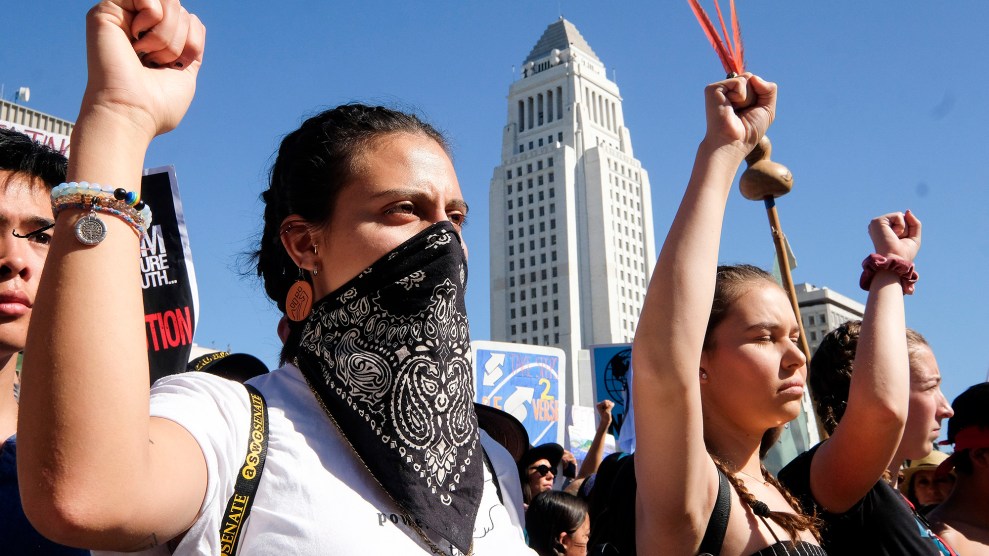
A student-led climate protest in Los Angeles. November 1, 2019Ringo H.W. Chiu/AP
This story was originally published by the Guardian and is reproduced here as part of the Climate Desk collaboration.
Young people are often seen as having a bleak worldview, plugged uncritically into social media and anxious about the climate crisis, among other pressing issues.
But a global study commissioned by the UN’s children’s agency, Unicef, appears to turn that received wisdom on its head. It paints a picture of children believing that the world is improving with each generation, even while they report anxiety and impatience for change on global heating.
The landmark intergenerational study, conducted for Unicef by Gallup for World Children’s Day, surveyed two age groups in 21 countries—aged 15-24 and 40-plus—sampled from different socioeconomic groups, to compare attitudes.
The results suggest the younger generation are more positive and globally minded than their elders, skeptical of what they read on social media (only 17 percent of young people said they trusted social media platforms “a lot” for information) and more invested in science and the possibility of global cooperation and international institutions.
The young people surveyed were also more likely to believe childhood had improved, voting healthcare, education and physical safety as being better for them than it had been for their parents’ generation.
“Born into a more digital, interconnected and diverse reality, young people see a world that is largely a better place for children than the one their parents grew up in—a safer and more abundant world that offers children better education, opportunities and hope for the future,” the report concludes.
“At the same time, young people are not complacent. They report greater struggles with mental health conditions. Amid a sea of mis- and disinformation, they report low levels of trust in the information sources they use most.”
Unicef’s executive director, Henrietta Fore, said: “There is no shortage of reasons for pessimism in the world today: climate change, the pandemic, poverty and inequality, rising distrust and growing nationalism. But here is a reason for optimism: children and young people refuse to see the world through the bleak lens of adults.”
Compared with older generations, she said: “The world’s young people remain hopeful, much more globally minded, and determined to make the world a better place. Today’s young people have concerns for the future but see themselves as part of the solution.”
Overall, the data suggests young people are products of globalisation—39 percent identified most with being part of the world, rather than their own nation or region, compared with 22 percent of the 40-plus group. With each additional year of age, people were on average about 1 percent less likely to identify as a global citizen.
The survey—conducted during the pandemic—also found young people were generally more trusting of national governments, scientists and international news media as sources of accurate information. Yet they were aware of the problems the world faced:
- The majority of young people saw serious risks for children online, such as seeing violent or sexually explicit content (78 percent) or being bullied (79 percent).
- While 64 percent of those in low- and middle-income countries believed children would be better off economically than their parents, young people in high-income countries had little faith in economic progress. There, fewer than a third of young respondents believed children today would grow up to be better off economically than their parents.
- More than a third of young people reported often feeling nervous or anxious, and nearly one in five said they often felt depressed or had little interest in doing things.
- On average, 59 percent of young people said children today faced more pressure to succeed than their parents did.
Joe Daly, senior partner at Gallup, said: “We cannot know what is on the minds of young people if we do not ask them. Unicef’s survey reinforces the importance of hearing from the next generation and understanding their perspectives.”
The survey found some areas of multi-generational alignment—notably around climate, the importance of education, global collaboration and children’s agency. By contrast, optimism, global mindedness and recognition of historical progress reflected some of the deepest divides.
Fore said: “While this research paints a nuanced view of the generational divide, a clear picture emerges: children and young people embody the spirit of the 21st century far more readily than their parents.”















